英语插入语用法详解(教学课资)
(完整word版)高中英语英语插入语用法详解
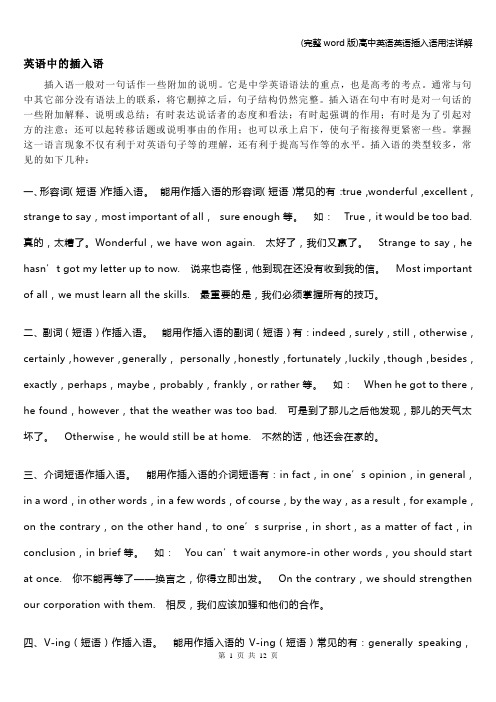
英语中的插入语插入语一般对一句话作一些附加的说明。
它是中学英语语法的重点,也是高考的考点。
通常与句中其它部分没有语法上的联系,将它删掉之后,句子结构仍然完整。
插入语在句中有时是对一句话的一些附加解释、说明或总结;有时表达说话者的态度和看法;有时起强调的作用;有时是为了引起对方的注意;还可以起转移话题或说明事由的作用;也可以承上启下,使句子衔接得更紧密一些。
掌握这一语言现象不仅有利于对英语句子等的理解,还有利于提高写作等的水平。
插入语的类型较多,常见的如下几种:一、形容词(短语)作插入语。
能用作插入语的形容词(短语)常见的有:true,wonderful,excellent,strange to say,most important of all,sure enough等。
如:True,it would be too bad. 真的,太糟了。
Wonderful,we have won again. 太好了,我们又赢了。
Strange to say,he hasn’t got my letter up to now.说来也奇怪,他到现在还没有收到我的信。
Most important of all,we must learn all the skills. 最重要的是,我们必须掌握所有的技巧。
二、副词(短语)作插入语。
能用作插入语的副词(短语)有:indeed,surely,still,otherwise,certainly,however,generally,personally,honestly,fortunately,luckily,though,besides,exactly,perhaps,maybe,probably,frankly,or rather等。
如:When he got to there,he found,however,that the weather was too bad. 可是到了那儿之后他发现,那儿的天气太坏了。
(完整版)插入语从句详解+例句

(完整版)插入语从句详解+例句插入语从句是一种特殊的从句结构,用于对主句内容进行解释或补充。
本文将详细介绍插入语从句的用法,并提供一些例句来帮助读者更好地理解。
插入语从句的特点是可以插在主句中的任何位置,它既可以作为定语修饰主句的名词或代词,也可以作为状语修饰整个句子。
插入语从句通常使用连词"that"引导,但在口语中可以省略。
以下是一些常见的插入语从句用法及例句:1. 作为定语:他赢得比赛的事实让所有人都感到惊讶。
- I ___ me when I was in need.我感激你在我困难时给予的帮助。
2. 作为状语:- Hopefully, the weather will be nice tomorrow.希望明天天气好。
- Frankly speaking, ___.坦率地说,我不同意你的决定。
3. 插入式分句:- He is, as we all know, a talented musician.众所周知,他是一个有才华的音乐家。
- The problem, to be honest, is not as easy as it seems.坦白地说,这个问题并不像看起来的那么简单。
4. 使用省略连词:- I think (that) you can finish the task on time.我认为你能按时完成任务。
她说她会参加派对。
通过插入语从句的使用,我们可以更加准确地表达自己的意思,并使句子更加生动有趣。
因此,在写作中合理运用插入语从句是很重要的。
希望本文对您的研究有所帮助。
如有任何疑问,请随时与我联系。
插入语的类型及其用法

插入语的类型及其用法插入语是一种附加成分,往往被人们所忽视。
但它富于表现力,能使语言丰富多彩,准确鲜明。
插入语的位置也较灵活,可以置于句首、句中或句末。
下面就其类型和用法谈谈自己的粗浅认识。
一、根据插入语的构成形式可分为8种类型,举例说明如下:1.“主语+及物动词”型:I think(suppose)我想,我认为;I believe我相信;I guess我猜;I hope我希望;You know你知道;You see你瞧,你明白;I wonder我想知道。
如:This,I think,is a good way to learn English.我想这是学习英语的好办法。
It belongs to me,you know.你要明白,这是我的。
2.介词短语型:in fact事实上;to one’s surprise(sorrow,amazement,joy)使人感到惊奇(悲伤、惊愕、高兴)的是;by the way顺便提一下;in other words换句话说。
如:To her surprise.she found herself in a different world.使她吃惊的是,她发现自己处在另一个世界。
By the way,have you seen the film Romance of the Three Kingdoms?顺便问一下,你看过《三国演义》这部影片吗?3.形容词引起的短语:sure enough果然;worst’still更糟糕的是;most important of all 更重要的是;most curious of all最为奇怪的是;strange真奇怪。
如:Strange.he often forgot to turn off the lights.真奇怪,他经常忘记关灯。
Sure enough,he came again the next day.果然他第二天来了。
英语插入语的位置与用法

英语插入语的位置与用法英语插入语是指在句子中添加的一些附加信息,通常用来强调某个词或表达某种情感。
插入语在句子中的位置和用法对句子的理解和表达起着重要的作用。
本文将探讨英语插入语的位置和用法。
一、插入语的位置插入语可以出现在句首、句中或句末,具体位置取决于插入语的类型和句子的结构。
1. 插入语出现在句首插入语出现在句首时,常常用逗号将其与句子的主体部分分隔开来。
例如:- Honestly, I don't think he will come to the party.(老实说,我认为他不会来参加派对。
)- Fortunately, we managed to finish the project on time.(幸运的是,我们及时完成了这个项目。
)2. 插入语出现在句中插入语出现在句中时,通常用逗号或括号将其与句子的其他部分隔开。
例如:- My brother, by the way, is studying abroad.(顺便说一下,我弟弟正在国外留学。
)- The weather, it seems, is going to be sunny tomorrow.(天气似乎明天会晴朗。
)3. 插入语出现在句末插入语出现在句末时,往往用逗号将其与句子其他部分分隔开来。
例如:- She should have apologized for her behavior, in my opinion.(我认为她应该为她的行为道歉。
)- He is a talented musician, no doubt.(毫无疑问,他是个有才华的音乐家。
)二、插入语的用法插入语可以用来表达情感、补充信息或进行解释等。
以下是常见的插入语用法:1. 表达情感插入语可以用来表达人们的情感或态度。
例如:- Oh, I'm so excited about the upcoming trip!(哦,我对即将到来的旅行太兴奋了!)- Alas, we lost the game again.(唉,我们又输了比赛。
高中英语中“插入语”用法归纳
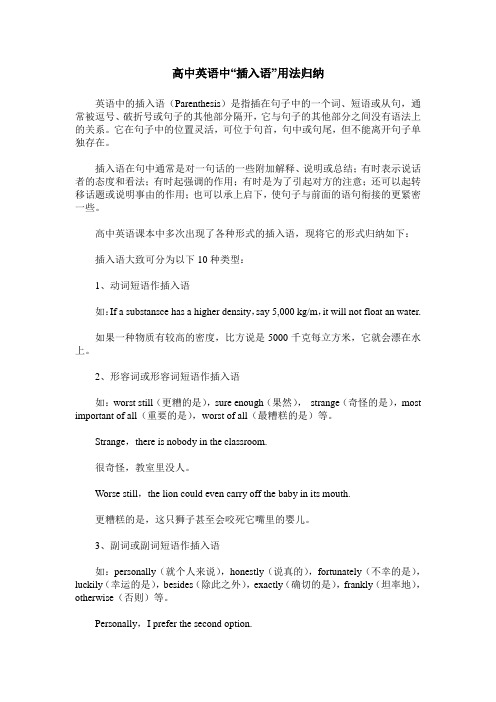
高中英语中“插入语”用法归纳英语中的插入语(Parenthesis)是指插在句子中的一个词、短语或从句,通常被逗号、破折号或句子的其他部分隔开,它与句子的其他部分之间没有语法上的关系。
它在句子中的位置灵活,可位于句首,句中或句尾,但不能离开句子单独存在。
插入语在句中通常是对一句话的一些附加解释、说明或总结;有时表示说话者的态度和看法;有时起强调的作用;有时是为了引起对方的注意;还可以起转移话题或说明事由的作用;也可以承上启下,使句子与前面的语句衔接的更紧密一些。
高中英语课本中多次出现了各种形式的插入语,现将它的形式归纳如下:插入语大致可分为以下10种类型:1、动词短语作插入语如:If a substansce has a higher density,say 5,000 kg/m,it will not float an water.如果一种物质有较高的密度,比方说是5000千克每立方米,它就会漂在水上。
2、形容词或形容词短语作插入语如:worst still(更糟的是),sure enough(果然),strange(奇怪的是),most important of all(重要的是),worst of all(最糟糕的是)等。
Strange,there is nobody in the classroom.很奇怪,教室里没人。
Worse still,the lion could even carry off the baby in its mouth.更糟糕的是,这只狮子甚至会咬死它嘴里的婴儿。
3、副词或副词短语作插入语如:personally(就个人来说),honestly(说真的),fortunately(不幸的是),luckily(幸运的是),besides(除此之外),exactly(确切的是),frankly(坦率地),otherwise(否则)等。
Personally,I prefer the second option.就我个人而言,我更喜欢第二种选择。
谈谈英语插入语的用法

学法新探插入语,不作句子任何成分,属于独立成分,即使将其删除,所在句子结构仍不会受影响。
它位置灵活,可以居于句首、句中或句末,常以逗号隔开,主要对句子起说明、解释、补充、强调、总结等作用,或表达说话者的看法或态度倾向,或引起听话者的注意,或转移话题等,是英语中一个“神奇”的语法知识点。
对此,笔者对高中英语插入语的用法进行了剖析,以期同学们能够准确地掌握和应用。
一、副词作插入语在英语中,有许多副词可以用作插入语,它们可以位于句首、句中或句末,以便对整句话起到解释、说明的作用。
常见的副词插入语有:honestly (老实说),luckily (幸运的是),fortunately (幸运的是),surely (简单的是),briefly (简而言之),certainly(无疑地),exactly (确切地说),personally (就本人而言),generally (一般地),obviously (明显地),apparently (显然地),frankly (坦率地说),incidentally (顺便提一下),essentially (实质上)等。
例如:①I do feel for you,honestly.老实说,我真的很同情你。
②Personally ,I ’ve always preferred Chinese food.就我个人来讲,我总是偏爱中国菜。
③Fortunately,my friend saw that something was seriously wrong .幸运的是,我的朋友发现了存在非常严重的错误。
④Pets ,certainly,can help children develop friend-ship skills.毫无疑问,宠物能够帮助孩子们培养交友技能。
在运用副词作插入语时,需要注意它与状语的区别。
一般地,副词作插入语,修饰整个句子,有逗号隔开;而副词作状语,则用来修饰形容词或动词,无逗号隔开。
英语中“插入语”常见的种类和用法

英语中“插入语”常见的种类和用法英语的插入语是句子的附加成分,是说话者对句子的内容所持的态度和所作的解释、说明等。
插入语与句子的其它成分无语法上的联系,是一种独立成分。
插入语能够使语言丰富多彩,富有表现力,在准确、鲜明地表达思想,增强语言表达效果上起着重要的作用。
为更好地掌握和运用英语,学好并运用好插入语是非常重要的。
插入语通常与句中其它部分没有语法上的联系,将它删掉之后,句子结构仍然是完整的。
书写时我们多半用逗号把它与句子的主句分开。
一、插入语的种类较多,常见的有:1.代词词组作插入语能用作插入语的代词词组有all the same , all told , all in all等。
例如:His students was reduced to fifty—six all told.他的学生减少到总共56人。
All in all, her achievement is greatly improved.总的来说,她的成绩有很大的好转。
2. 形容词(短语)作插入语常见的能用作插入语的形容词(短语)有:常见的能用作插入语的形容词(短语)有excellent,most important of all , true , wonderful, sure enough, strange to say , worst still等等。
例如:Wonderful , our team has won again.太好了,我们队又赢了。
Most important of all,we must hand in all the homework..最重要的是,我们要上交所有的作业。
True, it would be too late.真的,时间太晚了。
Strange to say, we have not got the news up to now.说来也奇怪,我们到现在还没有得到这个消息。
3.副词(短语)作插入语能用作插入语的副词(短语)有generally,frankly , indeed , surely , still , exactly,otherwise,, certainly,however , personally , honestly,fortunately , though,besides,perhaps,maybe, probably,or rather, lucki1y,等。
英语中“插入语”常见的种类和用法
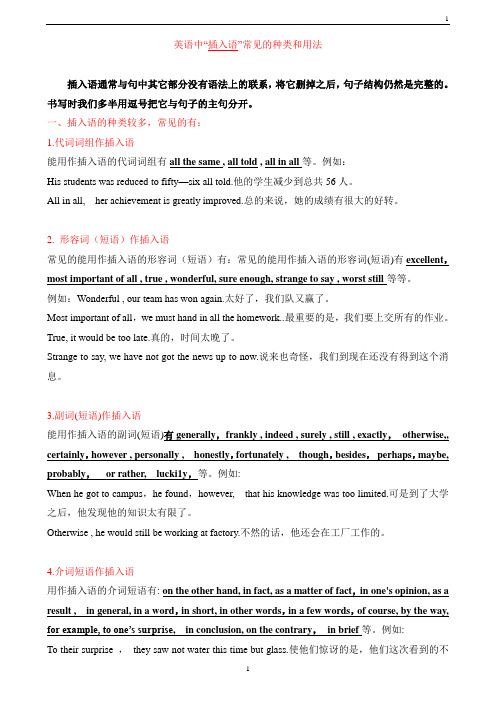
英语中“插入语”常见的种类和用法插入语通常与句中其它部分没有语法上的联系,将它删掉之后,句子结构仍然是完整的。
书写时我们多半用逗号把它与句子的主句分开。
一、插入语的种类较多,常见的有:1.代词词组作插入语能用作插入语的代词词组有all the same , all told , all in all等。
例如:His students was reduced to fifty—six all told.他的学生减少到总共56人。
All in all, her achievement is greatly improved.总的来说,她的成绩有很大的好转。
2. 形容词(短语)作插入语常见的能用作插入语的形容词(短语)有:常见的能用作插入语的形容词(短语)有excellent,most important of all , true , wonderful, sure enough, strange to say , worst still等等。
例如:Wonderful , our team has won again.太好了,我们队又赢了。
Most important of all,we must hand in all the homework..最重要的是,我们要上交所有的作业。
True, it would be too late.真的,时间太晚了。
Strange to say, we have not got the news up to now.说来也奇怪,我们到现在还没有得到这个消息。
3.副词(短语)作插入语能用作插入语的副词(短语)有generally,frankly , indeed , surely , still , exactly,otherwise,, certainly,however , personally , honestly,fortunately , though,besides,perhaps,maybe, probably,or rather, lucki1y,等。
插入语用法
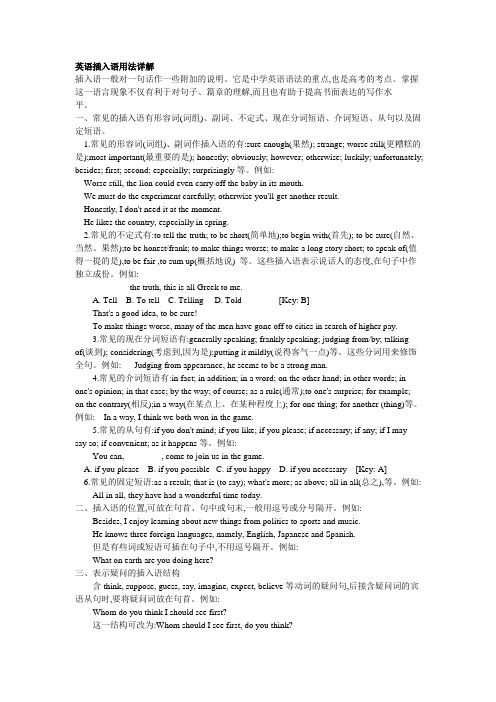
英语插入语用法详解插入语一般对一句话作一些附加的说明。
它是中学英语语法的重点,也是高考的考点。
掌握这一语言现象不仅有利于对句子、篇章的理解,而且也有助于提高书面表达的写作水平。
一、常见的插入语有形容词(词组)、副词、不定式、现在分词短语、介词短语、从句以及固定短语。
1.常见的形容词(词组)、副词作插入语的有:sure enough(果然); strange; worse still(更糟糕的是);most important(最重要的是); honestly; obviously; however; otherwise; luckily; unfortunately; besides; first; second; especially; surprisingly等。
例如:Worse still, the lion could even carry off the baby in its mouth.We must do the experiment carefully; otherwise you'll get another result.Honestly, I don't need it at the moment.He likes the country, especially in spring.2.常见的不定式有:to tell the truth; to be short(简单地);to begin with(首先); to be sure(自然、当然、果然);to be honest/frank; to make things worse; to make a long story short; to speak of(值得一提的是),to be fair ,to sum up(概括地说) 等。
这些插入语表示说话人的态度,在句子中作独立成份。
例如:________ the truth, this is all Greek to me.A. TellB. To tellC. TellingD. Told [Key: B]That's a good idea, to be sure!To make things worse, many of the men have gone off to cities in search of higher pay.3.常见的现在分词短语有:generally speaking; frankly speaking; judging from/by; talkingof(谈到); considering(考虑到,因为是);putting it mildly(说得客气一点)等。
英语插入语用法详解

英语插入语用法详解集团标准化工作小组 #Q8QGGQT-GX8G08Q8-GNQGJ8-MHHGN#英语中的插入语插入语一般对一句话作一些附加的说明。
它是中学英语语法的重点,也是高考的考点。
通常与句中其它部分没有语法上的联系,将它删掉之后,句子结构仍然完整。
插入语在句中有时是对一句话的一些附加解释、说明或总结;有时表达说话者的态度和看法;有时起强调的作用;有时是为了引起对方的注意;还可以起转移话题或说明事由的作用;也可以承上启下,使句子衔接得更紧密一些。
掌握这一语言现象不仅有利于对英语句子等的理解,还有利于提高写作等的水平。
插入语的类型较多,常见的如下几种:一、形容词(短语)作插入语。
能用作插入语的形容词(短语)常见的有:true,wonderful,excellent,strange to say,most important of all, sure enough等。
如:True,it would be too bad.真的,太糟了。
Wonderful,we have won again.太好了,我们又赢了。
Strange to say,he hasn’t got my letter up to now.说来也奇怪,他到现在还没有收到我的信。
Most important of all,we must learn all the skills.最重要的是,我们必须掌握所有的技巧。
二、副词(短语)作插入语。
能用作插入语的副词(短语)有:indeed,surely,still,otherwise,certainly,however,generally, personally,honestly,fortunately,luckily,though,besides,exactly,perhaps,maybe,probably,frankly,or rather等。
如:When he got to there,he found,however,that the weather was too bad.可是到了那儿之后他发现,那儿的天气太坏了。
英语插入语(教学课资)
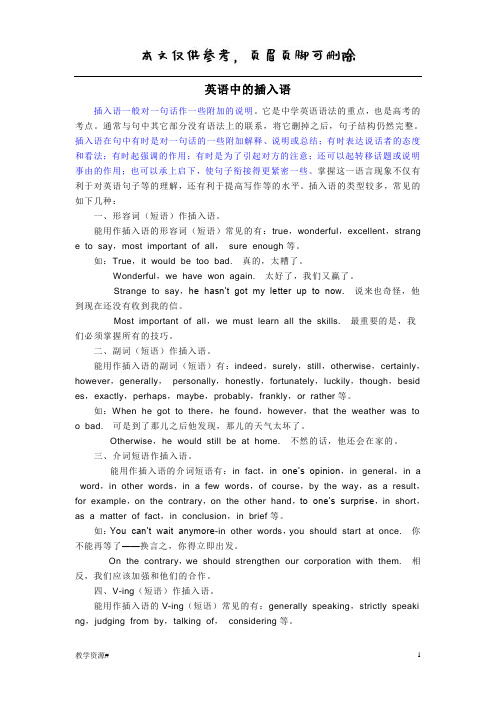
英语中的插入语插入语一般对一句话作一些附加的说明。
它是中学英语语法的重点,也是高考的考点。
通常与句中其它部分没有语法上的联系,将它删掉之后,句子结构仍然完整。
插入语在句中有时是对一句话的一些附加解释、说明或总结;有时表达说话者的态度和看法;有时起强调的作用;有时是为了引起对方的注意;还可以起转移话题或说明事由的作用;也可以承上启下,使句子衔接得更紧密一些。
掌握这一语言现象不仅有利于对英语句子等的理解,还有利于提高写作等的水平。
插入语的类型较多,常见的如下几种:一、形容词(短语)作插入语。
能用作插入语的形容词(短语)常见的有:true,wonderful,excellent,strang e to say,most important of all,sure enough等。
如:True,it would be too bad.真的,太糟了。
Wonderful,we have won again.太好了,我们又赢了。
Strange to say,he hasn’t got my letter up to now.说来也奇怪,他到现在还没有收到我的信。
Most important of all,we must learn all the skills.最重要的是,我们必须掌握所有的技巧。
二、副词(短语)作插入语。
能用作插入语的副词(短语)有:indeed,surely,still,otherwise,certainly,however,generally,personally,honestly,fortunately,luckily,though,besid es,exactly,perhaps,maybe,probably,frankly,or rather等。
如:When he got to there,he found,however,that the weather was to o bad.可是到了那儿之后他发现,那儿的天气太坏了。
插入语用法
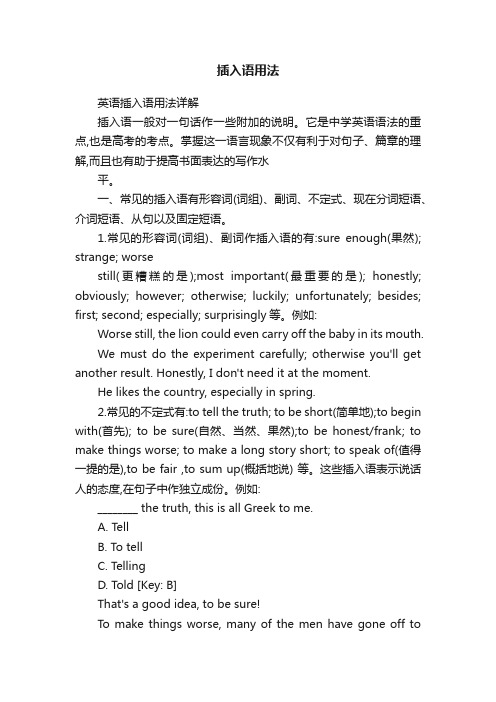
插入语用法英语插入语用法详解插入语一般对一句话作一些附加的说明。
它是中学英语语法的重点,也是高考的考点。
掌握这一语言现象不仅有利于对句子、篇章的理解,而且也有助于提高书面表达的写作水平。
一、常见的插入语有形容词(词组)、副词、不定式、现在分词短语、介词短语、从句以及固定短语。
1.常见的形容词(词组)、副词作插入语的有:sure enough(果然); strange; worsestill(更糟糕的是);most important(最重要的是); honestly; obviously; however; otherwise; luckily; unfortunately; besides; first; second; especially; surprisingly等。
例如:Worse still, the lion could even carry off the baby in its mouth.We must do the experiment carefully; otherwise you'll get another result. Honestly, I don't need it at the moment.He likes the country, especially in spring.2.常见的不定式有:to tell the truth; to be short(简单地);to begin with(首先); to be sure(自然、当然、果然);to be honest/frank; to make things worse; to make a long story short; to speak of(值得一提的是),to be fair ,to sum up(概括地说) 等。
这些插入语表示说话人的态度,在句子中作独立成份。
例如:________ the truth, this is all Greek to me.A. TellB. To tellC. TellingD. Told [Key: B]That's a good idea, to be sure!To make things worse, many of the men have gone off tocities in search of higher pay.3.常见的现在分词短语有:generally speaking; frankly speaking; judging from/by; talking of(谈到); considering(考虑到,因为是);putting it mildly(说得客气一点)等。
谈谈几种常见插入语的用法

and cheer up the old people.
Personally, the biggest challenge last year was the
总之,插入语的形式多样,在平时英语学习中,同
学们要注意对插入语进行归纳总结,从而丰富语言积
英语篇
康、富有和聪明的未来。
毫无疑问,北京最有代表性的文化标志是紫禁
skills, we will lead a happier and healthier life.
在我看来,
父母的支持和帮助是必要的,但我们不
能,我们将会过上更加幸福、
健康的生活。
are necessary, but we shouldn’
t be spoiled.
总之,如果我们尽最大的努力提高这些生活技
陈
定语从句作为高中英语三大从句——名词性从
句,状语从句和定语从句中之一,是高考必考的知识
霞
被修饰的名词 book 就是先行词。
二、分类
点。那么,怎样才能掌握定语从句的用法呢?笔者
定语从句分为限制性定语从句和非限制性定语
主要从定语从句的概念、分类、关系代词和关系副词
从句。限制性定语从句没有用逗号隔开,主句和从
fact(事实上), by the way(顺便提一下),to one’s surprise/
amazement(令人惊讶的是), on the contrary(恰恰相反)
等。例如:
It’s not difficult. On the contrary,
it’
s quite easy.
这并不难,恰恰相反,它容易得很。
例如:This is a book whose cover is yellow.
插入语用法知识点总结

插入语用法知识点总结插入语是英语中一种常见的修辞手法,用于在句子中插入额外的信息,以增强表达的丰富性和准确性。
插入语通常由逗号、破折号、括号或冒号等标点符号包围,它可以用于说明、解释、强调或提醒某个具体的事实或观点。
在本文中,我们将对插入语的用法进行总结,以帮助读者更好地理解和运用这一语法结构。
1. 前插语前插语位于主句之前,常用逗号将其与主句分隔开。
它可以用于提供额外信息、强调某个观点或引起读者的注意。
示例1:"Interestingly, the experiment yielded unexpected results.""有趣的是,这个实验得出了意想不到的结果。
"示例2:"In my opinion, we should focus on environmental protection.""依我之见,我们应该把重点放在环境保护上。
"2. 后插语后插语位于主句之后,同样用逗号与主句隔开。
它常用于补充说明、强调或提醒读者特定的观点或信息。
示例1:"He studied all night, exhausted.""他熬了一整夜,筋疲力尽。
"示例2:"She is an amazing pianist, as we all know.""众所周知,她是一位了不起的钢琴家。
"3. 补充语补充语可以进一步阐述或补充前面提到的事实或观点,常用括号或破折号将其包围。
示例1:"I finally arrived on time for the meeting (after getting stuck in traffic).""我终于及时赶到了会议现场(在堵车后)。
"示例2:"Tom - my best friend - helped me with the project.""汤姆(我的最好朋友)帮我完成了这个项目。
插入语用法归纳
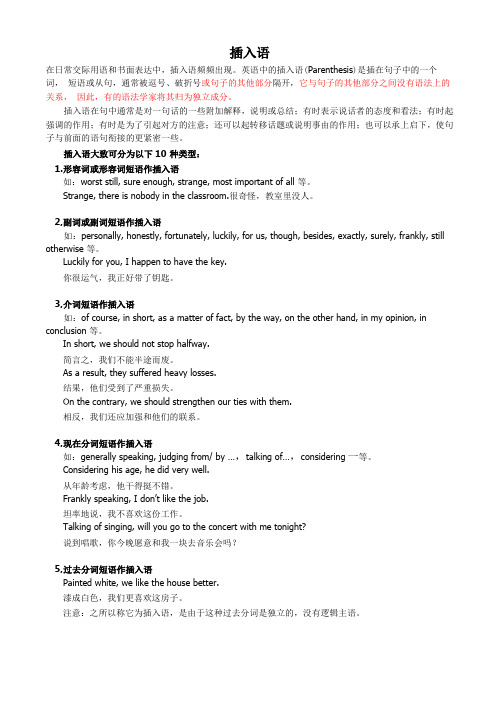
插入语在日常交际用语和书面表达中,插入语频频出现。
英语中的插入语(Parenthesis)是插在句子中的一个词,短语或从句,通常被逗号、破折号或句子的其他部分隔开,它与句子的其他部分之间没有语法上的关系,因此,有的语法学家将其归为独立成分。
插入语在句中通常是对一句话的一些附加解释,说明或总结;有时表示说话者的态度和看法;有时起强调的作用;有时是为了引起对方的注意;还可以起转移话题或说明事由的作用;也可以承上启下,使句子与前面的语句衔接的更紧密一些。
插入语大致可分为以下10种类型:1.形容词或形容词短语作插入语如:worst still, sure enough, strange, most important of all 等。
Strange, there is nobody in the classroom.很奇怪,教室里没人。
2,副词或副词短语作插入语如:personally, honestly, fortunately, luckily, for us, though, besides, exactly, surely, frankly, still otherwise 等。
Luckily for you, I happen to have the key.你很运气,我正好带了钥匙。
3,介词短语作插入语如:of course, in short, as a matter of fact, by the way, on the other hand, in my opinion, in conclusion 等。
In short, we should not stop halfway.简言之,我们不能半途而废。
As a result, they suffered heavy losses.结果,他们受到了严重损失。
On the contrary, we should strengthen our ties with them.相反,我们还应加强和他们的联系。
插入语的用法

插入语的用法插入语一般对一句话作一些附加的说明。
它是中学英语语法的重点,也是高考的考点。
掌握这一语言现象不仅有利于对句子、篇章的理解,而且也有助于提高书面表达的写作水平。
下面店铺就给大家介绍英语插入语如何使用。
一、常用做插入语的副词indeed的确, surely无疑, however然而, obviously显然,frankly坦率地说, naturally自然, luckily (或happily) for sb.算某人幸运,fortunately幸好,strangely奇怪,honestly真的,briefly简单地说等。
?1. Surely, she won't go to China Telecom with you.?当然她不会和你一起去中国电信。
2. Strangely, he has not been to China Unicom. Still more strangely, he has not called me.?奇怪,他未来过中国联通。
更奇怪,他没给我打电话。
?3. Fortunately, I found the book that I'd lost.?幸亏我找到了已丢失的那本书。
二、常见的作插入语的形容词或其短语?true真的, funny真可笑, strange to say说也奇怪, needless to say不用说, most important of all最为重要, worse still更糟糕的等。
?1. Strange to say (或True),2. he should have done such a thing.?说也奇怪(或真的),他竟然做出这样的事。
?2 Most important of all,you each overfulfiled your own task.?更为重要的,你们各自超额完成了自己的任务。
三、常用作插入语的介词短语in a few words(或in sum, in short)简而言之, in other words换句话说, in a sense在某种意义上, in general一般说来, in my view在我看来, in his opinion(judgment)按照他的意见(判断), in conclusion总之, in summary概括地说, in fact事实上, in the first place首先,in addition此外,of course当然,to our knowledge据我们所知, to my joy(delight, satisfaction)使我欣慰(高兴、满意)的, to their surprise(astonishment, amazement)使他们惊奇的,to her regret (disappointment)使她遗憾(失望)的,for instance(或example)例如, as a matter of fact事实上等。
怎样使用插入语
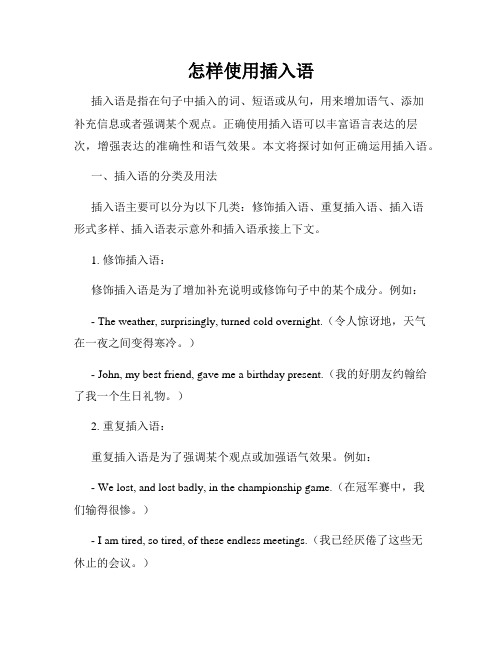
怎样使用插入语插入语是指在句子中插入的词、短语或从句,用来增加语气、添加补充信息或者强调某个观点。
正确使用插入语可以丰富语言表达的层次,增强表达的准确性和语气效果。
本文将探讨如何正确运用插入语。
一、插入语的分类及用法插入语主要可以分为以下几类:修饰插入语、重复插入语、插入语形式多样、插入语表示意外和插入语承接上下文。
1. 修饰插入语:修饰插入语是为了增加补充说明或修饰句子中的某个成分。
例如:- The weather, surprisingly, turned cold overnight.(令人惊讶地,天气在一夜之间变得寒冷。
)- John, my best friend, gave me a birthday present.(我的好朋友约翰给了我一个生日礼物。
)2. 重复插入语:重复插入语是为了强调某个观点或加强语气效果。
例如:- We lost, and lost badly, in the championship game.(在冠军赛中,我们输得很惨。
)- I am tired, so tired, of these endless meetings.(我已经厌倦了这些无休止的会议。
)3. 插入语形式多样:插入语的形式可以多种多样,可以是词、短语、从句等等。
例如:- Well, I don't think that's a good idea.(嗯,我认为那不是一个好主意。
)- In my opinion, we should focus on improving our customer service.(依我看,我们应该专注于提高我们的客户服务。
)- Honestly speaking, I don't believe what he said.(说实话,我不相信他说的话。
)4. 插入语表示意外:有时插入语用来表达意外或突发情况。
例如:- Oh my god, I can't believe what I just saw!(哦天哪,我简直不敢相信我刚才看到的!)- Wow, that's amazing!(哇,真是太神奇了!)5. 插入语承接上下文:有时插入语也可以用来承接上下文的语境,使语言更加连贯。
英语词汇中的插入语如何使用

英语词汇中的插入语如何使用在英语学习的过程中,词汇的运用是非常重要的一个环节。
而插入语作为词汇中的一个特殊部分,虽然看似不起眼,却能在很大程度上影响句子的表达和理解。
那么,什么是插入语?它又该如何正确使用呢?插入语是指在一个句子中,插入的一个或一组与句子的其他部分没有语法关系的词语或短语。
它通常用来对句子的内容进行补充、解释、说明或者表达说话者的态度、情感等。
插入语在句子中的位置比较灵活,可以放在句首、句中或句末。
常见的插入语有很多种类。
比如,表达肯定或否定的插入语,像“certainly(当然)”“surely(肯定)”“indeed(确实)”“no doubt(无疑)”“by no means(绝不)”“not at all(一点也不)”等。
以“Certainly, he is a very talented musician”(当然,他是一位非常有才华的音乐家。
)和“He is by no means a reliable person”(他绝不是一个可靠的人。
)为例,插入语“certainly”和“by no means”分别加强了肯定和否定的语气。
还有表达程度和范围的插入语,如“altogether(总共)”“in all(总共)”“in a word(总之)”“in short(简而言之)”“on the whole(总的来说)”等。
例如,“On the whole, the situation is improving”(总的来说,情况正在改善。
)“In short, we need to work harder”(简而言之,我们需要更努力地工作。
)另外,表达个人观点和态度的插入语也很常见,比如“p ersonally(就个人而言)”“honestly(老实说)”“frankly(坦率地说)”“fortunately(幸运的是)”“unfortunately(不幸的是)”等。
像“Personally, I think it's a good idea”(就个人而言,我认为这是个好主意。
英语中“插入语”常见的种类和用法
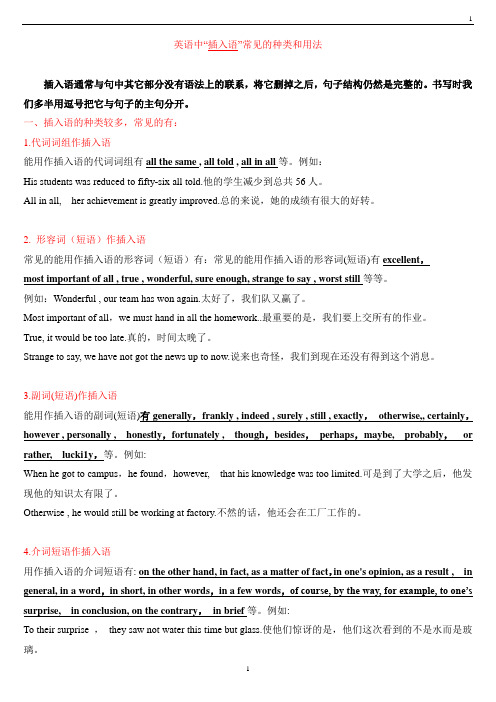
英语中“插入语”常见的种类和用法插入语通常与句中其它部分没有语法上的联系,将它删掉之后,句子结构仍然是完整的。
书写时我们多半用逗号把它与句子的主句分开。
一、插入语的种类较多,常见的有:1.代词词组作插入语能用作插入语的代词词组有all the same , all told , all in all等。
例如:His students was reduced to fifty-six all told.他的学生减少到总共56人。
All in all, her achievement is greatly improved.总的来说,她的成绩有很大的好转。
2. 形容词(短语)作插入语常见的能用作插入语的形容词(短语)有:常见的能用作插入语的形容词(短语)有excellent,most important of all , true , wonderful, sure enough, strange to say , worst still等等。
例如:Wonderful , our team has won again.太好了,我们队又赢了。
Most important of all,we must hand in all the homework..最重要的是,我们要上交所有的作业。
True, it would be too late.真的,时间太晚了。
Strange to say, we have not got the news up to now.说来也奇怪,我们到现在还没有得到这个消息。
3.副词(短语)作插入语能用作插入语的副词(短语)有generally,frankly , indeed , surely , still , exactly,otherwise,, certainly,however , personally , honestly,fortunately , though,besides,perhaps,maybe, probably,or rather, lucki1y,等。
- 1、下载文档前请自行甄别文档内容的完整性,平台不提供额外的编辑、内容补充、找答案等附加服务。
- 2、"仅部分预览"的文档,不可在线预览部分如存在完整性等问题,可反馈申请退款(可完整预览的文档不适用该条件!)。
- 3、如文档侵犯您的权益,请联系客服反馈,我们会尽快为您处理(人工客服工作时间:9:00-18:30)。
英语中的插入语
插入语一般对一句话作一些附加的说明。
它是中学英语语法的重点,也是高考的考点。
通常与句中其它部分没有语法上的联系,将它删掉之后,句子结构仍然完整。
插入语在句中有时是对一句话的一些附加解释、说明或总结;有时表达说话者的态度和看法;有时起强调的作用;有时是为了引起对方的注意;还可以起转移话题或说明事由的作用;也可以承上启下,使句子衔接得更紧密一些。
掌握这一语言现象不仅有利于对英语句子等的理解,还有利于提高写作等的水平。
插入语的类型较多,常见的如下几种:
一、形容词(短语)作插入语。
能用作插入语的形容词(短语)常见的有:true,wonderful,excellent,strange to say,most important of all,sure enough等。
如:True,it would be too bad.真的,太糟了。
Wonderful,we have won again.太好了,我们又赢了。
Strange to say,he hasn’t got my letter up to now.说来也奇怪,他到现在还没有收到我的信。
Most important of all,we must learn all the skills.最重要的是,我们必须掌握所有的技巧。
二、副词(短语)作插入语。
能用作插入语的副词(短语)有:indeed,surely,still,otherwise,certainly,however,generally,personally,honestly,fortunately,luckily,though,besides,exactly,perhaps,maybe,probably,frankly,or rather 等。
如:When he got to there,he found,however,that the weather was too bad.可是到了那儿之后他发现,那儿的天气太坏了。
Otherwise,he would still be at home.不然的话,他还会在家的。
三、介词短语作插入语。
能用作插入语的介词短语有:in fact,in one’s opinion,in general,in a word,in other words,in a few words,of course,by the way,as a result,for example,on the contrary,on the other hand,to one’s surprise,in short,as a matter of fact,in conclusion,in brief等。
如:You can’t wait anymore-in other words,you should start at once.你不能再等了——换言之,你得立即出发。
On the contrary,we should strengthen our corporation with them.相反,我们应该加强和他们的合作。
四、V-ing(短语)作插入语。
能用作插入语的V-ing(短语)常见的有:generally speaking,strictly speaking,judging from by,talking of,considering等。
如:Generally speaking,the weather there is neither too cold in winter nor too hot in summer.一般来说,那儿的气候冬天不太冷,夏天不太热。
Judging by his clothes,he may be an artist.从衣着来判断,他可能是个艺术家。
五、不定式短语作插入语。
能用作插入语的不定式短语有:to be frank,to be honest,
to be sure,to tell you the truth,to make matters worse,to sum up,to start with,to begin with等。
如:To be frank,I don’t quite agree with you.坦率地说,我不太同意你的意见。
To tell you the truth,I’m not so interested in the matter.跟你说实话,我对这件事情的兴趣不大。
To sum up,success results from hard work.总而言之,成功是艰苦努力的结果。
六、句子(陈述句和一般疑问句)作插入语。
能用作插入语的句子有:I am sure,
I believe,I think,I know,I suppose,I hope,I’m afraid,you see,what’s more,that is to say,as we know,as I see,believe it or not等。
如:Some animals only half-hibernate,that is to say,their sleep is not such a deep one.有些动物只是半冬眠,就是说,它们的睡眠并不是深度睡眠。
I believe,China will catch up with the developed countries sooner or later.我确信,中国迟早会赶上发达国家。
He can’t pass the exam,because he doesn’t study hard. What’s more,he isn’t so clever.他不能通过这次考试,因为他学习不认真,更何况他又不太聪明。
插入语的应用
插入语(句)是说话者对所表达意思的补充、强调、解释或者说话的态度,其位置灵活,常常用逗号或破折号与其他成分隔开,并且在语法上不影响其他成分。
例如:
I think,she has no feeling for your trouble. / She,I think,has no feeling for your trouble. 我想,她对你的遭遇无动于衷。
一. 常见的插入语和插入句。
1. 插入语常以副词(副词短语)、形容词(形容词短语)、介词短语、非谓语动词短语等形式出现。
( 1 )常见的副词及短语:indeed,surely,however,obviously,frankly,naturally,luckily / happily for sb. certainly 等。
( 2 )常见的形容词及短语:funny,needless to say (不用说),most important of all 等。
( 3 )常见的介词短语:by the way,in a few words / in sum / in short (简而言之),in other words,in general,in one's opinion / judgment (按照某人的意见),in fact,in the first place,of course,to one's knowledge / surprise / regret /satisfaction / mind / joy / disappointment 等。
( 4 )常见的现在分词短语:strictly / generally / honestly / personally / exactly / physically / speaking (严格地/ 一般地/ 坦诚地等)说;judging from / by …(根据……判断)等。
( 5 )常见的动词不定式短语:to be sure (无疑地),to sum up (概括地说),to tell the truth,to be honest,to be short,to conclude,to put it briefly,to put it in another way,to begin (start )with 等。
注意:上述单词或短语作插入语和状语时的区别。
例如:。
